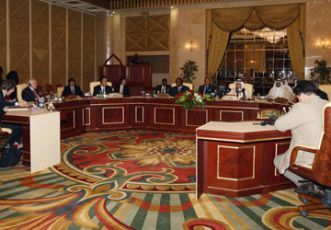Mediation seeks strong international support to end Darfur conflict
May 27, 2009 (DOHA) — Peace mediators sought today to draw a strong
commitment from the Five Permanent members of the UN Security Council
saying the complexity of the Darfur conflict requires concerted
efforts of the international community.
 Presidential envoys from China, France, Russia, United Kingdom and the
Presidential envoys from China, France, Russia, United Kingdom and the
United States met Wednesday in Doha with the Qatari state minister for
foreign affairs and the AU-UN joint mediator for Darfur peace.
“The international community needs to demonstrate a strong commitment
to help the people of Darfur to achieve peace and development,” Qatari
State Minister Ahmed Bin-Abdullah Al-Mahmoud told the presidential
envoys, according to the Qatari news agency
Al-Mahmoud added that the issue of Darfur has been fueling regional
and international concern for years, pointing at the same time that
this unfortunate conflict cost many lives and drove hundreds of
thousands of civilians from their home losing their money and
properties.
The minister also underscored that the solution to the Darfur problem
should be based on a broad national consensus aiming for a just,
comprehensive and lasting solution to stop the war and be a prelude to
a sustainable peace based on dialogue and adopting dialogue as the
only way to resolve differences and to emphasize the unity of Sudan
and the maintenance its territorial integrity.
Arab and African regional bodies agreed in September last year to work
together in order to end the Darfur conflict which has lasted since
six years ago. Qatar was chosen as host country and since the works
closely with Djibril Bassolé, the joint mediator.
The mediation last February succeeded to persuade the Sudanese
government and the Justice and Equality Movement to negotiate a
goodwill agreement. But they failed to work out a ceasefire due to
JEM’s refusal to stop fighting before the signing of a peace deal.
Also, the Sudanese stakeholders failed to implement the signed
agreement. After the ousting of 13 aid groups from the country, JEM had suspended the process. However, the recently appointed US special envoy to Sudan convinced the rebels to resume negotiations with Khartoum.
Speaking to the meeting, Bassolé today informed the five envoys that
mediation efforts will focus on the next stage to work out a framework
agreement between the negotiating parties. It would include cessation
of hostilities and set out a timetable for negotiations leading to a
just and lasting peace, he said.
The joint envoy also added that their plan comprises general
principles and key points to achieve peace, stability, definitive
cease-fire, the sharing of wealth and power, land ownership, justice,
humanitarian issues and control mechanisms for peace implementation on
the ground.
He pointed out that the forthcoming elections in the Sudan will
contribute to in an exceptional manner to the solution of Darfur
conflict, saying that allowing the participation of the people of
Darfur is important and contributes to stability.
Bassolé stressed the need to diffuse tension and rebuild confidence
between Chad and Sudan adding that the attack of Chadian rebels
triggered violence between the two countries.
Day after day, political instability in Ndjamena and tribal links
between Sudan and Chad are seen as an important factor in the six-year
conflict in Darfur province where some 300,000 people died and 2.7
people are displaced inside the country.
However there is no clear vision on how to deal with the Chadian
situation. Some want to include the resolution of the political
conflict in Ndjamena in a comprehensive process with Darfur while
other members of the international community refuse such a
cross-border perspective.
EU Special Representative for Sudan, Torben Brylle stressed the need
need to resolve the crisis between the two neighbors, saying the
resolution of this crisis is an important factor to achieve peace in
western Sudan.
The mediation last year thought to gather JEM and the Sudan Liberation
Movement (SLM) of Abdel Wahid Al-Nur as representatives of Darfur
rebellion with the Sudanese government.
However, Al-Nur refused to join the process before the disarming
of government militias and as the rebel JEM escalated violence, leading the to mediation to reunite the government and JEM in separate
talks in February 2009.
The French Presidential adviser for the African affairs, Bruno
Joubert, called for a comprehensive process that includes the
different rebel groups particularly Abdel Wahid Al-Nur.
He further urged JEM to abide by the principle of open negotiations
with the participation of the other groups.
In his speech, Bassolé also expressed hopes that Al-Nur joins the Doha process.
Today’s meeting was attended by Chinese envoy to Darfur Liu Guijin,
French envoy Bruno Joubert, EU envoy Torben Brylle, Russian envoy to
Sudan Mikhail Margelov, UK special envoy to Sudan Michael O’Neill and
US envoy to Sudan Scott Gration.
Delegations of the Sudanese government and the rebel JEM arrived today
to Doha to resume talks on the implementation of February goodwill
agreement. The issue of the exchange of prisoner of war and
humanitarian situation in Darfur would top the agenda of the meeting.
(ST)

Lokorai
Mediation seeks strong international support to end Darfur conflict
The world must walk the talk and move together to stop this war once and for all. The warring parties aren’t interested in making peace and they must be pressure to make meaningful concessions and reach a settlement to the people of Darfur.
JEM must learn from Southerners that capturing of towns never stopped the government from coming back to those towns and therefore advice they use the negotiation methods to arrive at their rights.
Election is coming also and this exercise should bother them and everyone, perhaps this could help bring any change to them and others.
Negotiators must be reminded also that talks aren’t easy things to do; they require patience, tact and sometime force to ensure that the process isn’t lost.
Good luck.
Lokorai